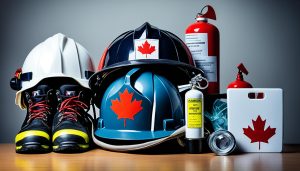If you have ever dreamed of soaring through the skies and experiencing the thrill of being a pilot, then pursuing a career in aviation might be the perfect choice for you. Canada, with its vast landscapes and thriving aviation industry, offers numerous opportunities for individuals who aspire to become pilots. In this step-by-step guide, we will provide you with all the information you need to know about how to become a pilot in Canada.
How to Become a Pilot in Canada?
Becoming a pilot requires dedication, commitment, and a thorough understanding of the requirements and steps involved in the process. Whether you dream of flying commercial airplanes or helicopters, this guide will walk you through the necessary qualifications and training needed to achieve your goal.
From pilot training requirements and costs to medical eligibility and career prospects, we will cover all the essential aspects you need to be aware of on your journey to becoming a pilot in Canada. So, let’s dive in and explore the exciting world of aviation together!
Pilot Training Requirements in Canada
When it comes to pursuing a career as a pilot in Canada, there are specific qualifications and requirements that aspiring pilots must meet. These requirements encompass various aspects, including flight school eligibility, obtaining a commercial pilot license, and going through the pilot certification process.
The first step towards becoming a pilot in Canada is to obtain a private pilot license. This license is the foundation for further training and allows you to fly small aircraft privately. To be eligible for a private pilot license, you must meet certain criteria set by Transport Canada, which include age, medical fitness, and language proficiency. Once you have obtained a private pilot license, you can move on to the next stage of training.
After obtaining a private pilot license, aspiring pilots are required to complete a certain number of flight hours to gain experience and skill. The specific flight hour requirements vary depending on the type of license you are pursuing. This flight experience is crucial in developing the necessary skills and competence to operate different types of aircraft in various weather conditions.
In addition to flight hours, pilots in Canada must also pass medical examinations to ensure they meet the physical and mental fitness requirements to operate an aircraft safely. These examinations assess factors such as hearing, physical fitness, eyesight, and mental strength. It is important to note that some medical conditions, such as asthma or hearing impairment, may impact eligibility to become a pilot in Canada.
Furthermore, aspiring pilots must enroll in a flight training program at an approved aviation school in Canada. These flight training programs provide the necessary theoretical knowledge and practical training required to become a proficient pilot. It is crucial to choose an aviation school that is recognized by Transport Canada to ensure that the training you receive meets the required standards.
Once the flight training program is completed, aspiring pilots can then obtain a commercial pilot license. This license enables pilots to fly for hire or reward and opens up opportunities for various career paths within the aviation industry. The process of obtaining a commercial pilot license involves meeting additional requirements, such as completing further flight hours and passing additional exams and assessments.
After obtaining a commercial pilot license, pilots must go through the pilot certification process, which involves meeting specific criteria set by Transport Canada. This process ensures that pilots have the necessary skills and knowledge to operate aircraft safely in different scenarios, including emergency situations.
Cost of Becoming a Pilot in Canada
Pursuing a career as a pilot can be a significant financial investment. The cost of becoming a pilot in Canada can vary depending on various factors. These factors include the type of license you are pursuing and the flight training program you choose. It’s important to understand the expenses involved so that you can plan your journey accordingly.
On average, the cost of obtaining a commercial pilot diploma in Canada ranges from approximately $40,900 (excluding fuel surcharges and taxes). This cost includes the necessary flight hours, ground school training, and examinations. However, it’s important to note that this cost can vary depending on the flight school you choose and any additional training requirements.
For those interested in obtaining a private pilot’s license, the cost typically ranges from around $15,000 to $20,000. This cost covers the flight training, ground school lessons, and examinations required to obtain the license.
It’s important to consider these costs alongside other expenses such as living expenses, transportation, and medical examinations. Additionally, keep in mind that these figures are average estimates and can vary based on individual circumstances and choices.
When comparing flight training programs and schools, it’s crucial to weigh the costs against the reputation and quality of education provided. Research different schools, speak to current and former students, and consider the training facilities and resources available.
Ultimately, the investment in becoming a pilot is a personal decision that requires careful financial planning. However, it’s also important to remember that a career as a pilot can be rewarding both personally and professionally, with opportunities for growth and advancement in the aviation industry.

Medical Requirements for Pilots in Canada
As a pilot aspiring to obtain a commercial pilot license in Canada, it is essential to fulfill specific medical requirements. These requirements ensure that pilots are in good health and capable of carrying out their responsibilities safely and effectively. Meeting these medical standards is crucial for the overall well-being of both the pilots and the passengers they transport.
To be eligible for a commercial pilot license in Canada, pilots must possess a category 1 medical certificate. This certificate confirms that the pilot meets the necessary medical standards to perform their duties. It involves undergoing a series of comprehensive medical tests to evaluate various aspects of their health, including:
- Hearing: Pilots must pass an audiology assessment to determine their hearing ability, ensuring that they can effectively communicate and interpret aural signals during flights.
- Physical Fitness: The physical fitness of pilots is assessed through a thorough medical examination, including tests for cardiovascular health, muscular strength, and overall physical conditions.
- Eyesight: Visual acuity and eye health are crucial for pilots to navigate and maintain situational awareness. Visual tests are conducted to assess the pilot’s eyesight and ensure that they meet the required standards.
- Mental Strength: Mental well-being is vital for pilots to make rational judgments and handle the stresses associated with flying. Psychological evaluations are conducted to ensure pilots possess the necessary mental resilience required for their role.
It’s important to note that certain medical conditions may disqualify individuals from pursuing a career as a pilot in Canada. Conditions such as asthma, significant hearing impairment, and certain psychological ailments may impede their ability to meet the required medical standards. Pilots are encouraged to consult with aviation medical examiners and regulatory authorities to determine their eligibility based on individual circumstances.
Obtaining a category 1 medical certificate is a crucial step in the path towards becoming a commercial pilot in Canada. By meeting the rigorous medical requirements, pilots can ensure the safety and well-being of themselves, their passengers, and fellow crew members.

Career Opportunities and Salary Prospects for Pilots in Canada
The aviation industry in Canada presents a wide range of promising career opportunities for pilots. With the increasing demand for pilots, there are job prospects available in both large and small airlines throughout the country.
When it comes to the salary prospects for Canadian pilots, various factors come into play. The amount pilots get paid can vary based on their experience level, the type of aircraft they fly, and the airline they work for. On average, pilots in Canada can earn over $90,000 per year, with potential for higher earnings as they gain more experience and advance in their careers.
The salary of a pilot is influenced by the type of pilot job opportunities available. For instance, a pilot in a major airline with international routes may earn more compared to a pilot in a regional airline. Additionally, pilots who operate larger and more advanced aircraft often receive higher salaries.
It’s important to note that with increased experience and qualifications, pilots can progress in their careers and potentially earn even higher salaries. This can include taking on positions such as Chief Pilot, Training Pilot, or eventually becoming a senior captain.
Average Pilot Salaries in Canada by Airline
| Airline | Average Salary |
|---|---|
| Air Canada | $88,000 – $275,000+ |
| WestJet | $51,000 – $182,000+ |
| Porter Airlines | $47,000 – $160,000+ |
| Chorus Aviation | $37,000 – $145,000+ |
| Sunwing Airlines | $38,000 – $130,000+ |
These salary ranges provide a general idea of what pilots can expect to earn in different Canadian airlines. However, it’s important to note that these figures can vary based on factors such as seniority, aircraft type, and additional benefits offered by the airlines.
Overall, a career as a pilot in Canada presents exciting opportunities and the potential for a fulfilling and well-compensated profession. Aspiring pilots can choose from a variety of aviation career paths, whether it be flying for major airlines, regional carriers, or cargo operations. With dedication, perseverance, and the necessary qualifications, pilots can embark on a rewarding journey in the Canadian aviation industry.

Conclusion
Pursuing a career as a pilot in Canada is a challenging yet rewarding journey that requires dedication, hard work, and financial investment. While the process may have its obstacles, the fulfillment that comes with becoming a pilot makes it all worthwhile. The aviation industry in Canada is experiencing a growing demand for pilots, offering ample job opportunities for aspiring individuals.
Is being a pilot worth it? Only those with a true passion for aviation can truly appreciate the answer. The thrill of taking control of an aircraft, the freedom of soaring through the skies, and the sense of accomplishment in delivering passengers safely to their destinations, are experiences that few other professions can match.
Is it hard to get a pilot job in Canada? The path to becoming a pilot in Canada requires meeting specific qualifications and surpassing rigorous training. However, with the increasing demand for pilots in the country, there are numerous employment prospects in both large and small airlines, making the journey to securing a pilot job highly achievable.
Is becoming a pilot hard? Yes, it requires commitment, perseverance, and a strong resolve to overcome the challenges along the way. From obtaining the necessary licenses to accumulating the required flight hours, pilot training in Canada demands dedication and determination. However, for those who possess a genuine passion for aviation, the pursuit of a pilot career is a fulfilling and worthwhile endeavor.
If you’re considering an aviation career in Canada, it’s important to understand that it is more than just a job; it’s a lifestyle. Pilots have the privilege of traveling to different destinations, experiencing the wonders of flight, and playing an integral role in the global aviation community. The opportunities for personal and professional growth are endless in this dynamic industry.
FAQ
1. How much does it cost to become a pilot in Canada?
The cost of becoming a pilot in Canada can vary depending on factors such as the type of license you are pursuing and the flight training program you choose. On average, the cost can range from approximately $40,900 for a commercial pilot diploma (excluding fuel surcharges and taxes) to around $15,000 – $20,000 for a private pilot’s license.
2. How many years does it take to become a pilot in Canada?
The time it takes to become a pilot in Canada can vary depending on various factors such as your availability for training and the type of license you are pursuing. On average, it can take around 1-2 years to obtain a commercial pilot license in Canada.
3. Is it hard to get a pilot job in Canada?
The demand for pilots in Canada is increasing, providing ample job opportunities for aspiring pilots. While it may be competitive to secure a pilot job, with the necessary qualifications and experience, there are opportunities available.
4. How much do Canadian pilots get paid?
The salary of Canadian pilots can vary depending on factors such as experience, type of aircraft they fly, and the airline they work for. On average, pilots in Canada can earn over $90,000 per year, with the potential to earn more as they gain experience.
5. Are pilots in high demand in Canada?
Yes, the demand for pilots in Canada is increasing. As the aviation industry expands, there is a need for more pilots to meet the growing demand for air travel.
6. How much do first-year pilots make?
The salary of first-year pilots can vary depending on factors such as the airline they work for and the type of aircraft they fly. On average, first-year pilots in Canada can expect to earn around $35,000 – $45,000 per year.
7. Is being a pilot worth it?
Pursuing a career as a pilot requires dedication, hard work, and financial investment. However, for those who have a passion for aviation, the rewards of becoming a pilot can be fulfilling. It offers exciting career opportunities and the chance to travel the world.
8. Is becoming a pilot hard?
Becoming a pilot requires time, effort, and commitment. It involves completing the necessary flight training, meeting medical requirements, and obtaining the required licenses. While the process may have its challenges, with the right mindset and determination, it is possible to become a pilot.
9. What type of pilot gets paid the most?
The salary of pilots can vary depending on factors such as the type of aircraft they fly and the airline they work for. Generally, pilots who fly larger commercial aircraft such as jets tend to earn higher salaries compared to pilots of smaller aircraft.
10. How to become a pilot in Canada?
To become a pilot in Canada, you need to follow specific steps. This includes obtaining a private pilot license, completing a certain number of flight hours, enrolling in a flight training program, obtaining a commercial pilot license, and going through the pilot certification process.




